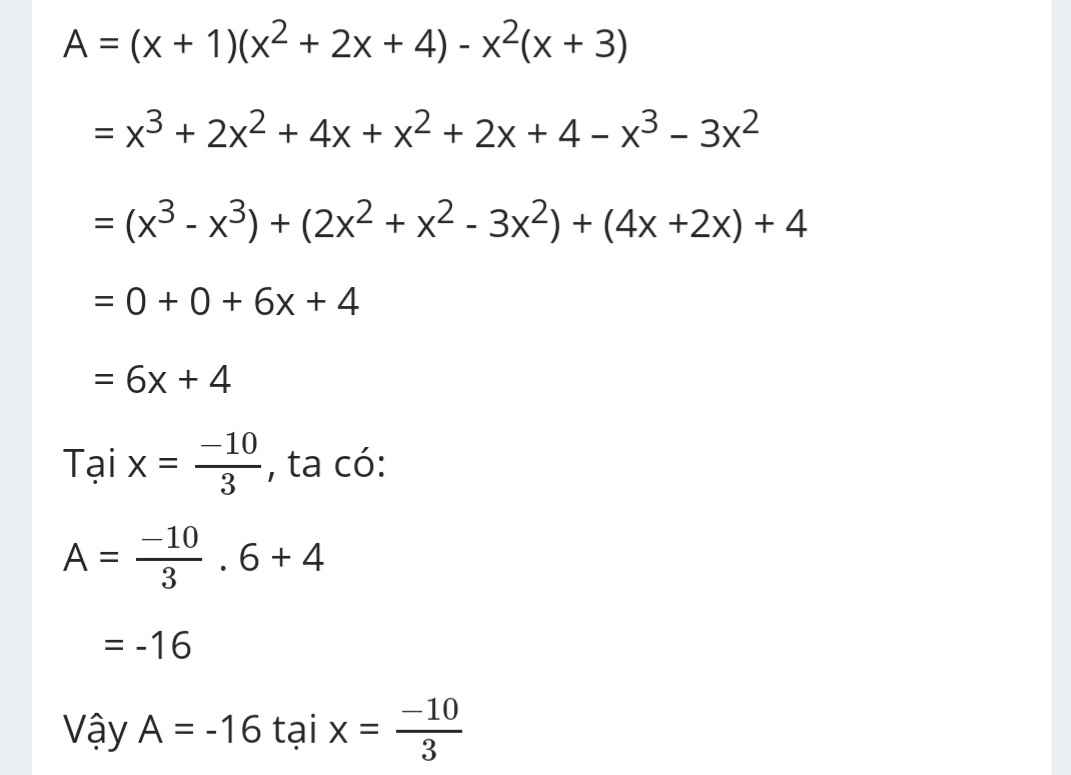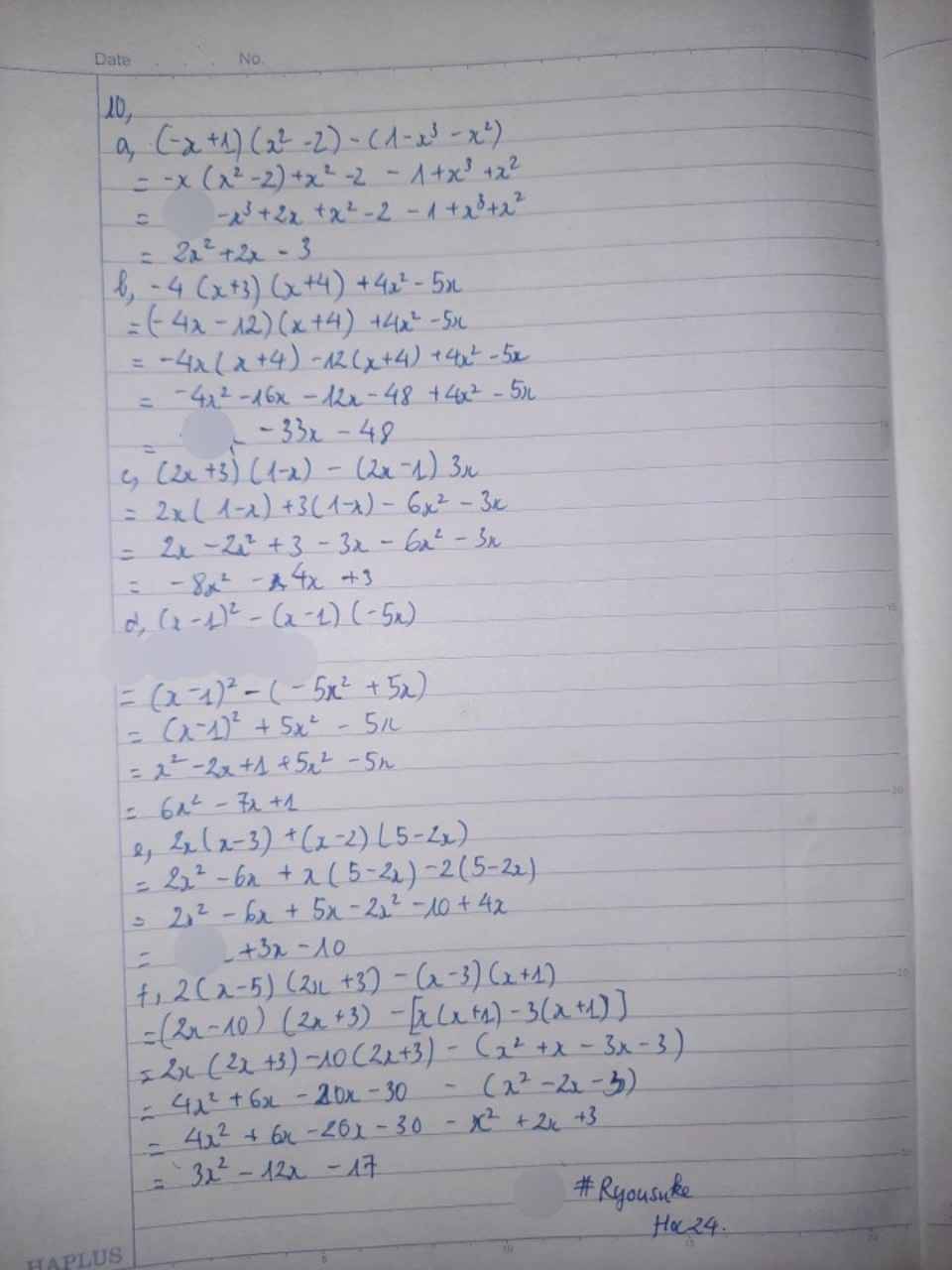(x+1).(x^2+2x+4)-x^2(x+3) với x=-1/10

Những câu hỏi liên quan
(x+1)(x^2+2x+4)-x^2(x+3) với x=-10/3
6x(2x-7)-(3x-5)(4x+7) tại x=-2
(x-3)(x+3)-(x+2)(x-1) tại x=1/3
Bài 10.Rút gọn biểu thức:
a)(-x+1).(x2-2)-(1-x3-x2)
b)-4.(x+3).(x+4)+4x2-5x
c)(2x+3).(1-x)-(2x-1).3x
d)(x-1)2-(x-1).(-5x)
e)2x(x-3)+(x-2).(5-2x)
f)2(x-5).(2x+3)-(x-3).(x+1)
Giúp mình với mình cảm ơn mn ạ
B1: tìm x;a, (x-3)^2+(4+x)(4-x)10b,(x+4)^2+(1+x)(1-x)7c,(x-4)^2-(x+2)(x-2)6d,4(x-3)^2-(2x+1)(2x-1)10e,25(x+3)^2+(1+5x)(1-5x)8g,-4(x-1)^2+(2x+1)(2x-1)-3B2:chứng minh rằng:1, a^2(a+1)+2a(a+1) chia hết cho 6 với mọi a thuộc Z2, x^2+2x +2 0 với mọi x thuộc Z3,x^2-x +10 với mọi x thuộc Z4,-x^2+4x -50 với mọi x thuộc Zmk cần gấp vì chiều 2h 30 mk phải đi học
Đọc tiếp
B1: tìm x;
a, (x-3)^2+(4+x)(4-x)=10
b,(x+4)^2+(1+x)(1-x)=7
c,(x-4)^2-(x+2)(x-2)=6
d,4(x-3)^2-(2x+1)(2x-1)=10
e,25(x+3)^2+(1+5x)(1-5x)=8
g,-4(x-1)^2+(2x+1)(2x-1)=-3
B2:chứng minh rằng:
1, a^2(a+1)+2a(a+1) chia hết cho 6 với mọi a thuộc Z
2, x^2+2x +2 >0 với mọi x thuộc Z
3,x^2-x +1>0 với mọi x thuộc Z
4,-x^2+4x -5<0 với mọi x thuộc Z
mk cần gấp vì chiều 2h 30 mk phải đi học
1/
a, (x-3)2+(4+x)(4-x)=10
<=>x2-6x+9+(16-x2)=10
<=>-6x+25=10
<=>-6x=-15
<=>x=5/2
còn lại tương tự a
2/
a, \(a^2\left(a+1\right)+2a\left(a+1\right)=\left(a^2+2a\right)\left(a+1\right)=a\left(a+1\right)\left(a+2\right)\)
Vì a(a+1)(a+2) là tích 3 nguyên liên tiếp nên a(a+1)(a+2) chia hết cho 2,3
Mà (2,3)=1
=>a(a+1)(a+2) chia hết cho 6 (đpcm)
b, \(x^2+2x+2=\left(x^2+2x+1\right)+1=\left(x+1\right)^2+1\)
Vì \(\left(x+1\right)^2\ge0\Rightarrow\left(x+1\right)^2+1\ge1>0\left(đpcm\right)\)
c, \(x^2-x+1=\left(x^2-x+\frac{1}{4}\right)+\frac{3}{4}=\left(x-\frac{1}{2}\right)^2+\frac{3}{4}\)
Vì \(\left(x-\frac{1}{2}\right)^2\ge0\Rightarrow\left(x-\frac{1}{2}\right)^2+\frac{3}{4}\ge\frac{3}{4}>0\)(đpcm)
d, \(-x^2+4x-5=-\left(x^2-4x+4\right)-1=-\left(x-2\right)^2-1\)
Vì \(-\left(x-2\right)^2\le0\Rightarrow-\left(x-2\right)^2-1\le-1< 0\) (đpcm)
Đúng 0
Bình luận (0)
g,\(-4\left(x-1\right)^2+\left(2x+1\right)\left(2x-1\right)=-3\)
\(\Leftrightarrow-4\left(x^2-2x+1\right)+4x^2-1=-3\)
\(\Leftrightarrow-4x^2+8x-4+4x^2-1=-3\)
\(\Leftrightarrow8x=2\)
\(\Leftrightarrow x=\frac{1}{4}\)
bn xem lại đi nha
Đúng 0
Bình luận (0)
Rút gọn rồi tính giá trị của biểu thức
a)A=(x+3)2+(x-3)(x+3)-2(x+2)(x-4);với x=-1/2
b)B=(3x+4)2-(x-4)(x+4)-10x;với x=-1/10
c)C=(x+1)2-(2x-1)2+3(x-2)(x+2'vỡi=1
d)D=(x-3)(x+3)+(x-2)2-2x(x-4);với x=-1
a) A = (x+3)2 + (x-3)(x+3) - 2(x+2)(x - 4)
= (x + 3)(x + 3) + (x - 3)(x + 3) - 2[x(x - 4) + 2(x - 4)]
= x(x + 3) + 3(x + 3) + x(x + 3) - 3(x + 3) - 2[x2 - 4x + 2x - 8]
= x2 + 3x + 3x + 9 + x2 + 3x - 3x - 9 - 2(x2 - 2x - 8)
= x2 + 3x + 3x + 9 +x2 + 3x - 3x - 9 - 2x2 + 4x + 16
= (x2 + x2 - 2x2) + (3x + 3x + 3x - 3x + 4x) + (9 - 9 + 16) = 10x + 16
Thay x = -1/2 vào biểu thức trên ta có : \(10\cdot\left(-\frac{1}{2}\right)+16=-5+16=11\)
b) \(B=\left(3x+4\right)^2-\left(x-4\right)\left(x+4\right)-10x\)
\(B=9x^2+24x+16-x\left(x+4\right)+4\left(x+4\right)-10x\)
\(B=9x^2+24x+16-x^2-4x+4x+16-10x\)
\(B=\left(9x^2-x^2\right)+\left(24x-4x+4x-10x\right)+\left(16+16\right)\)
\(B=8x^2+14x+32\)
Thay x = -1/10 vào biểu thức trên ta có : \(B=8\cdot\left(-\frac{1}{10}\right)^2+14\cdot\left(-\frac{1}{10}\right)+32=\frac{767}{25}\)
c) \(C=\left(x+1\right)^2-\left(2x-1\right)^2+3\left(x-2\right)\left(x+2\right)\)
\(C=x^2+2x+1-\left(2x-1\right)\left(2x-1\right)+3\left(x^2-4\right)\)
\(C=x^2+2x+1-2x\left(2x-1\right)+1\left(2x-1\right)+3x^2-12\)
\(C=x^2+2x+1-4x^2+2x+2x-1+3x^2-12\)
\(C=\left(x^2-4x^2+3x^2\right)+\left(2x+2x+2x\right)+\left(1-1-12\right)\)
\(C=6x-12\)
Thay x = 1 vào biểu thức ta có : C = 6.1 - 12 = 6 -12 = -6
Còn bài kia làm nốt đi
bài 1:
1) 20 - 2(x+4)= 4
2) 30 - [ 4(x-2)+ 15]= 3
3) 14 ⋮(2.x + 3)
4) (3x - 24).7 = 2.73
5) (x + 1)3 = 27
6) (2x - 6).47=49
7) (10 + 2x) : 42011 = 42013
8) [(8x - 12) :4].33 = 36
9) 6⋮(x - 1)
10) (x + 5)⋮(x + 2)
mong mn giúp mình gấp với ạ ^^
1: Ta có: \(20-2\left(x+4\right)=4\)
\(\Leftrightarrow2\left(x+4\right)=16\)
\(\Leftrightarrow x+4=8\)
hay x=4
5: Ta có: \(\left(x+1\right)^3=27\)
\(\Leftrightarrow x+1=3\)
hay x=2
Đúng 0
Bình luận (0)
Bài 1 :Rút gọn rồi tính giá trị của biểu thức :
a) A=(x+3)^2 + (x-3)×(x+3) - 2×(x+2)×(x-4); với x = 1/2
b) B=(3x+4)^2 - (x+4)×(x+4)-10x; với x = 1/10
c) C=(x+1)^2 - (2x-1)^2 + 3×(x-2)×(x+2); với x=1
d) D=(x-3)×(x+3) + (x-2)^2 - 2x×(x-4); với x = -1
Mọi người giúp mình với ạ ;-;
Bài 1:
a) Ta có: \(A=\left(x+3\right)^2+\left(x-3\right)\left(x+3\right)-2\left(x+2\right)\left(x-4\right)\)
\(=x^2+6x+9+x^2-9-2\left(x^2-4x+2x-8\right)\)
\(=2x^2+6x-2\left(x^2-2x-8\right)\)
\(=2x^2+6x-2x^2+4x+16\)
\(=10x+16\)
Thay \(x=\frac{1}{2}\) vào biểu thức \(A=10x+16\), ta được:
\(A=10\cdot\frac{1}{2}+16=5+16=21\)
Vậy: 21 là giá trị của biểu thức \(A=\left(x+3\right)^2+\left(x-3\right)\left(x+3\right)-2\left(x+2\right)\left(x-4\right)\) tại \(x=\frac{1}{2}\)
b) Ta có: \(B=\left(3x+4\right)^2-\left(x+4\right)\left(x+4\right)-10x\)
\(=9x^2+24x+16-\left(x^2+8x+16\right)-10x\)
\(=9x^2+24x+16-x^2-8x-16-10x\)
\(=8x^2+6x\)
Thay \(x=\frac{1}{10}\) vào biểu thức \(B=8x^2+6x\), ta được:
\(B=8\cdot\left(\frac{1}{10}\right)^2+6\cdot\frac{1}{10}=8\cdot\frac{1}{100}+\frac{6}{10}\)
\(=\frac{8}{100}+\frac{6}{10}\)
\(=\frac{8}{100}+\frac{60}{100}=\frac{17}{25}\)
Vậy: \(\frac{17}{25}\) là giá trị của biểu thức \(B=\left(3x+4\right)^2-\left(x+4\right)\left(x+4\right)-10x\) tại \(x=\frac{1}{10}\)
c) Ta có: \(C=\left(x+1\right)^2-\left(2x-1\right)^2+3\left(x-2\right)\left(x+2\right)\)
\(=x^2+2x+1-\left(4x^2-4x+1\right)+3\left(x^2-4\right)\)
\(=x^2+2x+1-4x^2+4x-1+3x^2-12\)
\(=6x-12\)
Thay x=1 vào biểu thức C=6x-12, ta được:
\(C=6\cdot1-12=6-12=-6\)
Vậy: -6 là giá trị của biểu thức \(C=\left(x+1\right)^2-\left(2x-1\right)^2+3\left(x-2\right)\left(x+2\right)\) tại x=1
d) Ta có: \(D=\left(x-3\right)\left(x+3\right)+\left(x-2\right)^2-2x\left(x-4\right)\)
\(=x^2-9+x^2-4x+4-2x^2+8x\)
\(=4x-5\)
Thay x=-1 vào biểu thức D=4x-5,ta được:
\(D=4\cdot\left(-1\right)-5=-4-5=-9\)
Vậy: -9 là giá trị của biểu thức \(D=\left(x-3\right)\left(x+3\right)+\left(x-2\right)^2-2x\left(x-4\right)\) tại x=-1
Đúng 0
Bình luận (0)
1) |2x - 1| 52) |2x - 1| |x + 5|3) |3x + 1| x - 2 4) |3 - 2x| x + 2 5) |2x - 1| 5 - x 6) |- 3x| x - 2 7) |2 - 3x| 2x + 1 8) |2x - 1| + |4x ^ 2 - 1| 0 9) (2x + 5)/(x + 3) + 1 4/(x ^ 2 + 2x - 3) - (3x - 1)/(1 - x) 10) (x - 1)/(x + 3) - x/(x - 3) (7x - 3)/(9 - x ^ 2) 11) 5 + 96/(x ^ 2 - 16) (2x - 1)/(x + 4) + (3x - 1)/(x - 4) 12) (2x)/(2x - 1) + x/(2x + 1) 1 + 4/((2x - 1)(2x + 1)) 13) (x + 2)/(x - 2) - 1/x 2/(x ^ 2 - 2x) 14) x/(2x - 6) + x/(2x + 2) (2x + 4)/(x ^ 2 - 2x - 3)
Đọc tiếp
1) |2x - 1| = 5
2) |2x - 1| = |x + 5|
3) |3x + 1| = x - 2
4) |3 - 2x| = x + 2
5) |2x - 1| = 5 - x
6) |- 3x| = x - 2
7) |2 - 3x| = 2x + 1
8) |2x - 1| + |4x ^ 2 - 1| = 0
9) (2x + 5)/(x + 3) + 1 = 4/(x ^ 2 + 2x - 3) - (3x - 1)/(1 - x)
10) (x - 1)/(x + 3) - x/(x - 3) = (7x - 3)/(9 - x ^ 2)
11) 5 + 96/(x ^ 2 - 16) = (2x - 1)/(x + 4) + (3x - 1)/(x - 4)
12) (2x)/(2x - 1) + x/(2x + 1) = 1 + 4/((2x - 1)(2x + 1))
13) (x + 2)/(x - 2) - 1/x = 2/(x ^ 2 - 2x)
14) x/(2x - 6) + x/(2x + 2) = (2x + 4)/(x ^ 2 - 2x - 3)
Giải chi tiết hộ mik với ạ
a, [(x-2)(x+10)]/3-[(x+4)(x+10)]/12=[(x-2)(x+4)] b, (x+2)2/8-2(2x+1)=25+(x-2)2/3 c, (7x2-14x-5)/15=(2x+1)2/5-(x-1)2/3. d, [(7x+1)(x-2)]/10+2/5=(x-2)2/5+[(x-1)(x-3)]/2
1. Tìm số tự nhiên x biết 1) 3^x . 3=243 2) 7.2^x=56 3) x^3=8 4)x^20=x 5) 2^x-15=17 6) (2x+1)^3=9.81 7) x^6:x^3=115 8) ( 2x-15)^5=(2x-15)^3 9) 3^x+2-5.3^x=36 10) 7.4^x-1+4^x+1=23 Giúp tớ bài này với
1: =>3^x=81
=>x=4
2: =>2^x=8
=>x=3
3: =>x^3=2^3
=>x=2
4: =>x^20-x=0
=>x(x^19-1)=0
=>x=0 hoặc x=1
5: =>2^x=32
=>x=5
6: =>(2x+1)^3=9^3
=>2x+1=9
=>2x=8
=>x=4
7: =>x^3=115
=>\(x=\sqrt[3]{115}\)
8: =>(2x-15)^5-(2x-15)^3=0
=>(2x-15)^3*[(2x-15)^2-1]=0
=>2x-15=0 hoặc (2x-15)^2-1=0
=>2x-15=0 hoặc 2x-15=1 hoặc 2x-15=-1
=>x=15/2 hoặc x=8 hoặc x=7
Đúng 2
Bình luận (1)
1. Tìm số tự nhiên x biết:
1) \(3^x.3=243\)
\(3^x=243:3\)
\(3^x=81\)
\(3^x=3^4\)
\(\Rightarrow x=4\)
_____
2) \(7.2^x=56\)
\(2^x=56:7\)
\(2^x=8\)
\(2^x=2^3\)
\(\Rightarrow x=3\)
_____
3) \(x^3=8\)
\(x^3=2^3\)
\(\Rightarrow x=3\)
_____
4) \(x^{20}=x\)
\(x^{20}-x=0\)
\(x\left(x^{19}-1\right)=0\)
\(\Rightarrow x=0\) hoặc \(x=1\)
5) \(2^x-15=17\)
\(2^x=17+15\)
\(2^x=32\)
\(2^x=2^5\)
\(\Rightarrow x=5\)
_____
6) \(\left(2x+1\right)^3=9.81\)
\(\left(2x+1\right)^3=729=9^3\)
\(\rightarrow2x+1=9\)
\(2x=9-1\)
\(2x=8\)
\(x=8:2\)
\(\Rightarrow x=4\)
_____
7) \(x^6:x^3=125\)
\(x^3=125\)
\(x^3=5^3\)
\(\Rightarrow x=5\)
_____
8) \(\left(2x-15\right)^5=\left(2x-15\right)^3\)
\(\rightarrow\left(2x-15\right)^5-\left(2x-15\right)^3=0\)
\(\left(2x-15\right)^3.\left[\left(2x-15\right)^2-1\right]=0\)
\(\Leftrightarrow\left\{{}\begin{matrix}\left(2x-15\right)^3=0\\\left(2x-15\right)^2-1=0\end{matrix}\right.\Leftrightarrow\left[{}\begin{matrix}x=\dfrac{15}{2}\\x=7\\x=8\end{matrix}\right.\)
_____
9) \(3^{x+2}-5.3^x=36\)
\(3^x.\left(3^2-5\right)=36\)
\(3^x.\left(9-5\right)=36\)
\(3^x.4=36\)
\(3^x=36:4\)
\(3^x=9\)
\(3^x=3^2\)
\(\Rightarrow x=2\)
_____
10) \(7.4^{x-1}+4^{x+1}=23\)
\(\rightarrow7.4^{x-1}+4^{x-1}.4^2=23\)
\(4^{x-1}.\left(7+4^2\right)=23\)
\(4^{x-1}.\left(7+16\right)=23\)
\(4^{x-1}.23=23\)
\(4^{x-1}=23:23\)
\(4^{x-1}=1\)
\(4^{x-1}=4^1\)
\(\rightarrow x-1=0\)
\(x=0+1\)
\(\Rightarrow x=1\)
Chúc bạn học tốt
Đúng 1
Bình luận (0)

























